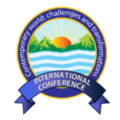
Prof. Dr. Khalid Sultan
Dean Faculty of Social Sciences (FSS)
Professor of Media and Communication Studies
National University of Modern Languages (NUML)
Short Bio: Dr. Khalid Sultan is a seasoned academician with 30 years of hands-on experience in national and international academics institutions and media organizations. At present leading 09 Departments of Faculty of Social Sciences (FSS) as Dean and Professor (BPS-21) in NUML—a Federal Chartered University. Headed a team of academicians and professionals from different nationalities in a multicultural environment for 10- years in the Middle East. Authored 03 books, a book chapter and 51 research papers out of which 24 are in Higher Education Commission (HEC), Pakistan recognized research journals. Chaired 31 Ph.D. and 114 M. Phil defenses. He is also heading and as well as part of many reputed research journals.
He has also been appointed at many significant positions such as President Institutional Performance Evaluation (IPE), NUML. Member IPE, Quality Assurance Agency (QAA), Higher Education Commission (HEC), Pakistan. Nominated as a subject expert for Postdoctoral Fellowships Program Phase III HEC-Batch I, 2021. Member Association of Media and Communication Academic Professionals (AMCAP). He has also been Evaluating National and International Ph.D. and M. Phil research work including Ph.D. research thesis for Bharathiar University, Tamil Nadu, India and RMIT, Australia.
Keynote Topic: Media Effects Paradigm in the Digital Age
The last few decades have seen communication study applied to become a powerful force for public education and behavior change. With the growth of mass media and the scientific methods to measure impacts, communication now plays a crucial role in social change, especially in the nations of Latin America, Africa, and Asia. It promises to play even larger role in the future. The power of communication is clear. Communication influences how people vote. Communication determines what people buy. Communication affects what people wish for and what they aspire to become. Communication shapes how people conduct their daily lives, even their sexual behavior. There is a surprisingly long tradition of effects-based audience research, and an examination of it reveals a significant body of different approaches. All have in some way sought to examine the effects of media output on their audiences and all have argued that the media influence their audiences in some way. In this backdrop the technological advancement and media development coupled with the utilization of digital technology and its misuse has also erupted as a major challenge for policymakers and educators. My todays talk would suggest a framework for academicians, sociologists, parents, and information technology experts in the light of the relevant literature to sensitize the youth towards responsible and productive use of the technology. This framework is based on two important themes, including Digital Responsibility and Digital Citizenship Etiquette.
